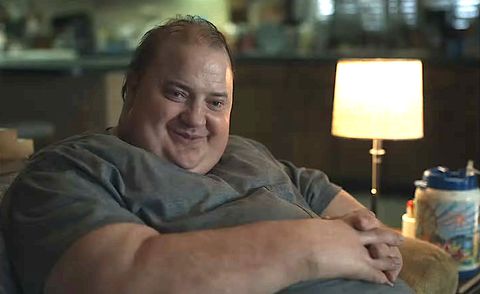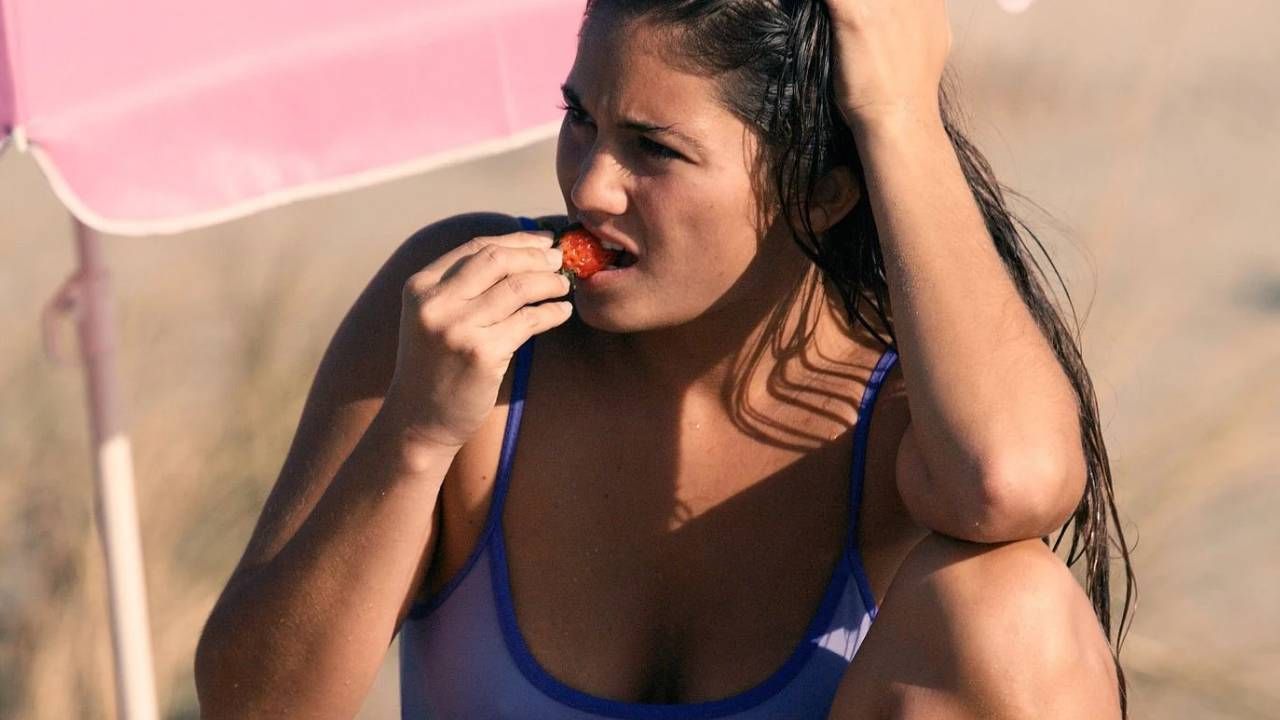How could it be otherwise in a Darren Aronofsky film, the end of ‘The Whale’ gives rise to questions and interpretations.
‘The Whale’ stands out for the incredible transformation of Brendan Fraser. But he’s not the first actor to layer silicone and makeup on top of it for a role. Although he has been left out of the Best Picture nomination, Fraser’s performance is also one of the most acclaimed of the year and favorite to win the Oscar for Best Actor at the 2023 Oscars. But beyond his impressive physical transformation, already seen in the trailers and promotional images, the moment of truth arrives, that of seeing the film.
As always in Aronofsky, this is an irregular and daring film that mixes religion and spirit with moments designed to make any priest get up from his chair. In the middle, of course, the important thing, a series of characters as destroyed as they are well built (no, there is no contradiction) and a drama that navigates the edge of the ridiculous without falling, at least for the most part, into it.
Let’s remember, for those who have not seen it (you are wrong to read this, because we are going to talk about the end) that the film is not about obesity, as it might seem at first. The Whale is a story of depression, which in the case of the protagonist has led to a compulsive and suicidal way of eating, with no other intention than death. The protagonist, a literature professor who continues to work via zoom (with the camera turned off, of course) tries to mend his relationship with his daughter, whom he abandoned 9 years ago after running away with one of his students, shortly before he died. . That said, it’s time to discuss the loose ends and the final springboard from which the tape jumps, so here come the spoilers…
‘The whale (The Whale)’: explained ending of the secondary characters
We might think that ‘The Whale’ is a concise film since it takes place in a single setting and has only five (six with the delivery man) characters. After all, it is based on the play by Samuel D. Hunter. However, the truth is that the path of the secondary characters towards the outcome also deserves attention.
The first doubt is Dan (Sathya Sridharan), the food delivery man who is seeing his curiosity to meet Charlie (Brendan Fraser) grow. We see how every time she goes to his home she tries to start a bigger conversation with him. However, Charlie usually waits until he leaves, to hear the car, to go out. But last time, Dan waits on the stairs just to see Dan. His response could not be worse or more inconsiderate. He just can’t hide his disgust face, until he manages to react and leave. It’s a plot that could have pointed to something more mysterious but in the end it only reflects, and reinforces that idea in Charlie’s head, as any ordinary person would react with disgust at the appearance of him.

Less mysteries is involved in the character of Liz (Hong Chau), Charlie’s only friend and his personal and free nurse. However, under their relationship there is something more painful. Liz was the adoptive sister of Alan, Charlie’s partner. She first had to take care of her brother as she self-destructed out of sheer depression. If her brother stayed in her bones, after burying him and identifying her corpse, Charlie condemned her to suffer something similar and opposite, to see how he killed himself by eating. In the finale, Liz waits downstairs for Charlie and Ellie to finish talking and we don’t see her again. But we don’t doubt for a moment that she won’t be able to save Charlie or get him to the hospital. At least his martyrdom is over.
We also have Mary (Samantha Morton), Charlie’s ex-wife, who struggles with resentment and the pain that caused her husband to leave her for a man. Also in full depression, we see that Mary did not let Charlie see Ellie for more than spite. Overcome with the pain of the breakup, Mary’s fear was that her ex-husband would believe that she had failed as a mother to her by turning Ellie into a very troubled teenager. If Charlie regrets not having been with her daughter, Mary’s weight is having been alone with her, and therefore being the only one “to blame” for her daughter’s mental state. There is nothing more painful than seeing a mother admit that her daughter is “bad”, period.
Of course, there’s also Thomas (Your Simpkins), the fake missionary whose character serves as a beautiful counterpoint to Ellie. Although the film ends with religious and spiritual touches, the truth is that ordinary religion, that of organizations or sects, does not look good. Thomas’s character seems like an ideal young man who wants to help Charlie through the word of God. But as the film progresses we discover that he is a thief and runaway ex-addict who, in his religious fixation, has set out to convert Charlie as an atonement. Although his story ends well for him thanks to Ellie, we see how behind his facade Thomas only felt disgust for Charlie, both because of his appearance and because of his homosexuality.

But maybe the key is Ellie (Sadie Sink). Her character is the most complex and also the most mysterious. The paternal abandonment of her has caused her a personality of rejection towards everything. A hatred that has isolated her from the world. She has no friends and she lives by trying to annoy everyone she meets. We could say that she seeks approval and love but, at the same time, she takes refuge from achieving it by spreading hate and doing everything unpleasant that she can think of to push people away. Her mother has already given in to the “badness of her” of hers. Only Charlie, refugee in the essay that his daughter wrote about ‘Moby Dick’ at the age of 13, is convinced that his daughter is a wonderful person. Little by little, and with more failures than successes, Charlie goes out of his way to tell her, completely honestly, how wonderful she is. Although Ellie rejects these claims, seeing her father rise up to her, on his deathbed, gives us hope that she has finally broken through that barrier around her, created her father, and opened up again to human affection.
‘The whale (The Whale)’: Ending explained, what happens to the protagonist?
But if something dislodges from ‘The Whale’ it is his last scene. After her first meeting with Ellie, Ellie dares Charlie to get up and walk with her to the door. Charlie fails miserably. It’s at the end of the movie, when Charlie has taken his little journey of redemption and put his cards on the table with everyone around him, that he tries again. On paper, Charlie is seconds from death, but he’s just fired Thomas for not being able to stand his looks or his homosexuality, he’s put his cards on the table with his ex-wife, he’s thanked his guardian angel Liz … He has to finish convincing Ellie. So, in his final minutes, Charlie gets up without help and walks towards Ellie. However, we don’t get to see if she arrives or not. What we get is Charlie lit up. It is a representation of his death, but also of his arrival in heaven. You only need to remember Aronofsky movies like Noe, The Source of Life or Mother! to verify that, like Charlie, the director has read the bible more than once.

The film spares a final hug between father and daughter, or a tearful moment through a physical achievement that would have been unreal. Charlie manages to get up and take a few steps, but dies before reaching his daughter. However, she has proven what she wanted to prove, and she ascends to the sky that Thomas will probably never see.
Of course we can get pragmatic and think that, outside of that ascent, what we have is Ellie crushed and screaming in panic with the 200 kg corpse of her father on top of her. But the real plane that no longer exists at that moment, where the film jumps completely to the spiritual plane. It is a dramatic ending, after all the protagonist dies, but also hopeful. The main character dies but I ascend to heaven, in peace with some secondary characters who should, after their encounters with Charlie, be able to improve his life little by little.
Source: Fotogramas
Rose James is a Gossipify movie and series reviewer known for her in-depth analysis and unique perspective on the latest releases. With a background in film studies, she provides engaging and informative reviews, and keeps readers up to date with industry trends and emerging talents.








